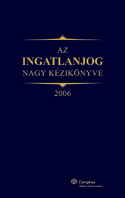
Client protection
Transaction and Client Security
Act LXIV of 2007 strengthens the security of legal transactions by amending several laws. The new provisions relating to attorneys have been in effect since 1 January 2008. Another piece of legislation which came into force at the same time was Ministerial Decree 54/2007.(XII.21.) IRM, aimed at strengthening the security of legal transactions. It sets out the detailed rules of the checks which attorneys must make of personal identity and identity documents. To put this new legislation into action, the Hungarian Bar Association has drawn up and enforced operational regulations – no. 2/2007.(11.19.) – covering attorneys’ personal identification duties.
The attorney must check the client against his or her personal identification document, and check the identification document against the central records. This constitutes client identification. The new rules are intended to enable attorneys to prevent anybody from falling victim to fraud perpetrated by false documents; to promote prevention or detection of transactions financing or supporting terrorism; to impede money laundering; and to prevent attorneys from involuntarily becoming part of such transactions. An attorney meets the requirements of the new regulation and is authorized and able to carry out this work only if he or she has the requisite equipment and has the right to make “qualified electronic signature” (Act XXXV of 2001). All the members of dr. Hidasi and Partners Law Office has such authorization, therefore authorized and able without restriction to draft and countersign documents, authenticate specimen of signatures and handle documents placed on deposit. The tightening of personal identification requirements and the broadening of means for identifying and controlling documents are applicable in legal matters where the attorney drafts and countersigns documents, and accepts and processes documents placed on deposit. These are most commonly cases involving title or usufruct on real estate, right of enjoyment, way leave, real estate purchase option, mortgage, and company start-up, change of company data, specimen signature authentication, or sale or purchase of shares in a company or stake in another organization.
The attorney must check the client against his or her personal identification document, and check the identification document against the central records. This constitutes client identification. The new rules are intended to enable attorneys to prevent anybody from falling victim to fraud perpetrated by false documents; to promote prevention or detection of transactions financing or supporting terrorism; to impede money laundering; and to prevent attorneys from involuntarily becoming part of such transactions. An attorney meets the requirements of the new regulation and is authorized and able to carry out this work only if he or she has the requisite equipment and has the right to make “qualified electronic signature” (Act XXXV of 2001). Every member of Dr Hidasi and Partners Law Office has such authorization, and so is authorized and able without restriction to draft and countersign documents, authenticate specimen signatures, and handle documents placed on deposit. The tightening of personal identification requirements and the broadening of means for identifying and controlling documents are applicable in legal matters where the attorney drafts and countersigns documents, and accepts and processes documents placed on deposit. These are most commonly cases involving title or usufruct on real estate, right of enjoyment, way leave, real estate purchase option, mortgage, and company start-up, change of company data, specimen signature authentication, or sale or purchase of shares in a company or stake in another organization.
The attorney must check the client against his or her personal identification document, and check the identification document against the central records. This constitutes client identification. The new rules are intended to enable attorneys to prevent anybody from falling victim to fraud perpetrated by false documents; to promote prevention or detection of transactions financing or supporting terrorism; to impede money laundering; and to prevent attorneys from involuntarily becoming part of such transactions. An attorney meets the requirements of the new regulation and is authorized and able to carry out this work only if he or she has the requisite equipment and has the right to make “qualified electronic signature” (Act XXXV of 2001). Every member of Dr Hidasi and Partners Law Office has such authorization, and so is authorized and able without restriction to draft and countersign documents, authenticate specimen signatures, and handle documents placed on deposit. The tightening of personal identification requirements and the broadening of means for identifying and controlling documents are applicable in legal matters where the attorney drafts and countersigns documents, and accepts and processes documents placed on deposit. These are most commonly cases involving title or usufruct on real estate, right of enjoyment, way leave, real estate purchase option, mortgage, and company start-up, change of company data, specimen signature authentication, or sale or purchase of shares in a company or stake in another organization.
Personal identification
The attorney establishes the client’s identity and address by the identity card and official address card provided by the client. A valid passport or driving license (in the new “card” form) may also be used for proving identity. For persons under the age of 14, the identification document is the official certificate containing the personal identity number and address. Other certificates and temporary certificates are not suitable as evidence of identity in the above cases. The identity of an organization or company must be proved by a company’s court registration ruling or application which is not more than 30 days old. The identity of the person who is authorized to proceed by virtue of representing the organization or through authorization must be identified by identity card and official address card. Identification of a foreign organization (with or without legal personality) requires credible evidence of registration in the official records of the organization’s home country. The person representing and acting on behalf of a foreign organization with legal personality must be identified by personal identity card and official address card.
The attorney is obliged to obtain from the client written consent to make a photocopy of his or her identification document. Upon obtaining the photocopying consent, the attorney makes a photocopy of the document and places it among the case documents together with the declaration of consent. If the client does not give consent, the attorney records the data in a controllable form but without making a photocopy. The client’s declaration of refusal must also be put in writing and placed among the case documents. In the above matters, the attorney identifies not only his own client but the other party in the case. For purposes of identification, therefore, “client” means all parties to the transaction and their authorized, legal and/or organizational representatives. The attorney is obliged to carry out personal identification for the above transactions, but may also do so in other cases. Identification must be carried out to ascertain the identity of the client engaging the attorney, whatever purpose that may be for. In the latter cases, however, the attorney may depart from the new strict rules by using another document for identification, and need not identify all persons involved in the transaction in every case.
The attorney is obliged to obtain from the client written consent to make a photocopy of his or her identification document. Upon obtaining the photocopying consent, the attorney makes a photocopy of the document and places it among the case documents together with the declaration of consent. If the client does not give consent, the attorney records the data in a controllable form but without making a photocopy. The client’s declaration of refusal must also be put in writing and placed among the case documents. In the above matters, the attorney identifies not only his own client but the other party in the case. For purposes of identification, therefore, “client” means all parties to the transaction and their authorized, legal and/or organizational representatives. The attorney is obliged to carry out personal identification for the above transactions, but may also do so in other cases. Identification must be carried out to ascertain the identity of the client engaging the attorney, whatever purpose that may be for. In the latter cases, however, the attorney may depart from the new strict rules by using another document for identification, and need not identify all persons involved in the transaction in every case.
The attorney is obliged to obtain from the client written consent to make a photocopy of his or her identification document. Upon obtaining the photocopying consent, the attorney makes a photocopy of the document and places it among the case documents together with the declaration of consent. If the client does not give consent, the attorney records the data in a controllable form but without making a photocopy. The client’s declaration of refusal must also be put in writing and placed among the case documents. In the above matters, the attorney identifies not only his own client but the other party in the case. For purposes of identification, therefore, “client” means all parties to the transaction and their authorized, legal and/or organizational representatives. The attorney is obliged to carry out personal identification for the above transactions, but may also do so in other cases. Identification must be carried out to ascertain the identity of the client engaging the attorney, whatever purpose that may be for. In the latter cases, however, the attorney may depart from the new strict rules by using another document for identification, and need not identify all persons involved in the transaction in every case.
Document control
Document control is carried out at the attorney’s discretion and requires the consent of the client. Document control may also be carried out without consent if the attorney detects an unusual circumstance in the course of personal identification and/or a doubt arises regarding the accuracy of lawfulness of the client identification data obtained previously. In cases subject to Act LXXXIII of 2001 on tightening the provisions relating to combating terrorism and preventing money laundering and on certain restrictive measures, document control is compulsory and does not depend on the client’s consent. For the purposes of document control, “client” means all persons for whom the attorney has an obligation to conduct personal identification.
The attorney first informs the client of the purpose, means and content of the document control, the procedure and time of handling the data learned in the course of the document control, and the cases when the attorney may refuse to provide service or is obliged to inform the police. The attorney performs document control by making an electronic request to the Central Office of Public Administration and Electronic Public Services for data from the central records as listed below. The attorney compares this data with the data on the client’s personal identification and address certification documents. In the above transactions, the comparison may also be made if the client has not given consent. The following data from the client’s identification document or official certificate of personal identification number and address may be controlled without consent: – the issue and validity of the personal identification card or official address card, and whether it has been issued, lost, stolen, destroyed, found or discovered,
– the details of the loss, theft, destruction, finding, replacement, return, surrender or withdrawal of a travel document, the data related to the placement of a warning sign, and the period of validity of the travel document,
– data relating to the type, document identifying sign, issue and validity (period and category) of a vehicle driving license, and data relating to its having been lost, stolen, destroyed, found or discovered or having had a warning sign attached,
– the number, type, validity and period of extension of a document certifying registration or right of residence,
– the type and number of a travel or personal identification document belonging to EEA citizens or their family members reported as lost, and the date of reporting,
– the number and validity period of an issued (extended) visa and data relating to its geographical validity,
– the number, serial number and validity period of an issued (extended) residence permit,
– type and identification data of a third-country citizen’s travel document which has been reported lost, stolen or destroyed, and the date of reporting. The data which may be checked in addition to the above if consent is given are: – personal identification data,
– citizenship or statelessness, or status as refugee, immigrant, permanent resident or EEA citizen,
– address,
– portrait photograph,
– signature,
– the name, short name and registered address of a legal person or an organization without legal personality, and in the case of a foreign-based company its Hungarian branch office, company registration number or other registration number. The attorney is obliged to print out the reply and safeguard it in written form for 8 years. The query is subject to charge.
Refusal of service by attorney
The attorney is obliged to refuse to provide service in drafting a document if:
– he is aware that the document is to be used for an unlawful purpose or to avoid the law,
– the party did not provide data to establish his or her personal identity,
– the party could not produce a valid identity card or certificate,
– the attorney found in the course of document control that the identification document had been reported lost, stolen or destroyed and the fact of its having been found or discovered has not been entered into the records,
– data, facts or circumstances indicating money laundering or finance for terrorism arises,
– the attorney detects another cause for concern. In the preparation of a document, the party’s refusal to give consent for control of the personal identification document must be regarded as a cause for concern.
Document control is carried out at the attorney’s discretion and requires the consent of the client. Document control may also be carried out without consent if the attorney detects an unusual circumstance in the course of personal identification and/or a doubt arises regarding the accuracy of lawfulness of the client identification data obtained previously. In cases subject to Act LXXXIII of 2001 on tightening the provisions relating to combating terrorism and preventing money laundering and on certain restrictive measures, document control is compulsory and does not depend on the client’s consent. For the purposes of document control, “client” means all persons for whom the attorney has an obligation to conduct personal identification.
The attorney first informs the client of the purpose, means and content of the document control, the procedure and time of handling the data learned in the course of the document control, and the cases when the attorney may refuse to provide service or is obliged to inform the police. The attorney performs document control by making an electronic request to the Central Office of Public Administration and Electronic Public Services for data from the central records as listed below. The attorney compares this data with the data on the client’s personal identification and address certification documents. In the above transactions, the comparison may also be made if the client has not given consent. The following data from the client’s identification document or official certificate of personal identification number and address may be controlled without consent: – the issue and validity of the personal identification card or official address card, and whether it has been issued, lost, stolen, destroyed, found or discovered,
– the details of the loss, theft, destruction, finding, replacement, return, surrender or withdrawal of a travel document, the data related to the placement of a warning sign, and the period of validity of the travel document,
– data relating to the type, document identifying sign, issue and validity (period and category) of a vehicle driving license, and data relating to its having been lost, stolen, destroyed, found or discovered or having had a warning sign attached,
– the number, type, validity and period of extension of a document certifying registration or right of residence,
– the type and number of a travel or personal identification document belonging to EEA citizens or their family members reported as lost, and the date of reporting,
– the number and validity period of an issued (extended) visa and data relating to its geographical validity,
– the number, serial number and validity period of an issued (extended) residence permit,
– type and identification data of a third-country citizen’s travel document which has been reported lost, stolen or destroyed, and the date of reporting. The data which may be checked in addition to the above if consent is given are: – personal identification data,
– citizenship or statelessness, or status as refugee, immigrant, permanent resident or EEA citizen,
– address,
– portrait photograph,
– signature,
– the name, short name and registered address of a legal person or an organization without legal personality, and in the case of a foreign-based company its Hungarian branch office, company registration number or other registration number. The attorney is obliged to print out the reply and safeguard it in written form for 8 years. The query is subject to charge.
Refusal of service by attorney
The attorney is obliged to refuse to provide service in drafting a document if:
– he is aware that the document is to be used for an unlawful purpose or to avoid the law,
– the party did not provide data to establish his or her personal identity,
– the party could not produce a valid identity card or certificate,
– the attorney found in the course of document control that the identification document had been reported lost, stolen or destroyed and the fact of its having been found or discovered has not been entered into the records,
– data, facts or circumstances indicating money laundering or finance for terrorism arises,
– the attorney detects another cause for concern. In the preparation of a document, the party’s refusal to give consent for control of the personal identification document must be regarded as a cause for concern.


